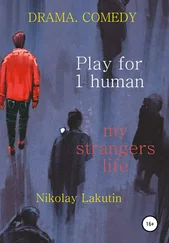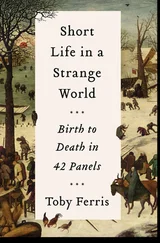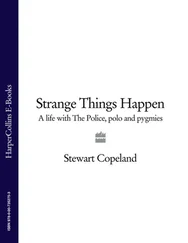Douglas Hofstadter - I Am a Strange Loop
Здесь есть возможность читать онлайн «Douglas Hofstadter - I Am a Strange Loop» весь текст электронной книги совершенно бесплатно (целиком полную версию без сокращений). В некоторых случаях можно слушать аудио, скачать через торрент в формате fb2 и присутствует краткое содержание. Жанр: Прочая документальная литература, на английском языке. Описание произведения, (предисловие) а так же отзывы посетителей доступны на портале библиотеки ЛибКат.
- Название:I Am a Strange Loop
- Автор:
- Жанр:
- Год:неизвестен
- ISBN:нет данных
- Рейтинг книги:4 / 5. Голосов: 1
-
Избранное:Добавить в избранное
- Отзывы:
-
Ваша оценка:
- 80
- 1
- 2
- 3
- 4
- 5
I Am a Strange Loop: краткое содержание, описание и аннотация
Предлагаем к чтению аннотацию, описание, краткое содержание или предисловие (зависит от того, что написал сам автор книги «I Am a Strange Loop»). Если вы не нашли необходимую информацию о книге — напишите в комментариях, мы постараемся отыскать её.
I Am a Strange Loop — читать онлайн бесплатно полную книгу (весь текст) целиком
Ниже представлен текст книги, разбитый по страницам. Система сохранения места последней прочитанной страницы, позволяет с удобством читать онлайн бесплатно книгу «I Am a Strange Loop», без необходимости каждый раз заново искать на чём Вы остановились. Поставьте закладку, и сможете в любой момент перейти на страницу, на которой закончили чтение.
Интервал:
Закладка:
Among the keys to GEB ’s success was its alternation between chapters and dialogues, but I didn’t intend, thirty years later, to copycat myself with another such alternation. I was in a different frame of mind, and I wanted this book to reflect that. But as I was approaching the end, I wanted to try to compare my ideas with well-known ideas in the philosophy of mind, and so I started saying things like, “Skeptics might reply as follows…” After I had written such phrases a few times, I realized I had inadvertently fallen into writing a dialogue between myself and a hypothetical skeptical reader, so I invented a pair of oddly-named characters and let them have at each other for what turned out to be one of the longest chapters in the book. It’s not intended to be uproariously funny, although I hope my readers will occasionally smile here and there as they read it. In any case, fans of the dialogue form, take heart — there are two dialogues in this book.
I am a lifelong lover of form–content interplay, and this book is no exception. As with several of my previous books, I have had the chance to typeset it down to the finest level of detail, and my quest for visual elegance on each page has had countless repercussions on how I phrase my ideas. To some this may sound like the tail wagging the dog, but I think that attention to form improves anyone’s writing. I hope that reading this book not only is stimulating intellectually but also is a pleasant visual experience.
A Useful Youthfulness
GEB was written by someone pretty young (I was twenty-seven when I started working on it and twenty-eight when I completed the first draft — all written out in pen on lined paper), and although at that tender age I had already experienced my fair or unfair share of suffering, sadness, and moral soul-searching, one doesn’t find too much allusion to those aspects of life in the book. In this book, though, written by someone who has known considerably more suffering, sadness, and soul-searching, those hard aspects of life are much more frequently touched on. I think that’s one of the things about growing older — one’s writing becomes more inward, more reflective, perhaps wiser, or perhaps just sadder.
I have long been struck by the poetic title of André Malraux’s famous novel La Condition humaine. I guess each of us has a personal sense of what this evocative phrase means, and I would characterize I Am a Strange Loop as being my own best shot at describing what “the human condition” is.
One of my favorite blurbs for GEB came from the physicist and writer Jeremy Bernstein, and in part it said, “It has a youthful vitality and a wonderful brilliance…” True music to my ears! But unfortunately this flattering phrase got garbled at some point, and as a result there are now thousands of copies of GEB floating around on whose back cover Bernstein proclaims, “It has a useful vitality…” What a letdown, compared with a “youthful” vitality! And yet perhaps this new book, in its older, more sober style, will someday be described by someone somewhere as having a “useful” vitality. I guess worse things could be said about a book.
And so now I will stop talking about my book, and will let my book talk for itself. In it I hope you will discover messages imbued with interest and novelty, and even with a useful, if no longer youthful, vitality. I hope that reading this book will make you reflect in fresh ways on what being human is all about — in fact, on what just-plain being is all about. And I hope that when you put the book down, you will perhaps be able to imagine that you, too, are a strange loop. Now that would please me no end.
— Bloomington, Indiana
December, MMVI.

PROLOGUE
An Affable Locking of Horns

[As I stated in the Preface, I wrote this dialogue when I was a teen-ager, and it was my first, youthful attempt at grappling with these difficult ideas.]
Dramatis personæ:
Plato: a seeker of truth who suspects consciousness is an illusion
Socrates: a seeker of truth who believes in consciousness’ reality

PLATO: But what then do you mean by “life”, Socrates? To my mind, a living creature is a body which, after birth, grows, eats, learns how to react to various stimuli, and which is ultimately capable of reproduction.
SOCRATES: I find it interesting, Plato, that you say a living creature is a body, rather than has a body. For surely, many people today would say that there are at least some living creatures that have souls independent of their bodies.
PLATO: Yes, and with those I would agree. I should have said that living creatures have bodies.
SOCRATES: Then you would agree that fleas and mice have souls, however insignificant.
PLATO: My definition does require that, yes.
SOCRATES: And do trees have souls, and blades of grass?
PLATO: You have used words to put me in this situation, Socrates. I will revise what I said — only animals have souls.
SOCRATES: But no, I have not only used words, for there is no distinction to be found between plants and animals, if you examine small enough creatures.
PLATO: You mean there are some creatures sharing the properties of plant and animal? Yes, I guess I can imagine such a thing, myself. Now I suppose you will force me into saying that only humans have souls. SOCRATES: No, on the contrary, I will ask you, what animals do you usually consider to have souls?
PLATO: Why, all higher animals — those which are able to think. SOCRATES: Then, at least higher animals are alive. Now can you truly consider a stalk of grass to be a living creature like yourself?
PLATO: Let me put it this way, Socrates: I can only imagine true life with a soul, and so I must discard grass as true life, though I could say it has the symptoms of life.
SOCRATES: I see. So you would classify soulless creatures as only appearing alive, and creatures with souls as true life. Then am I right if I say that your question “What is true life?” depends on the understanding of the soul?
PLATO: Yes, that is right.
SOCRATES: And you have said that you consider the soul as the ability to think?
PLATO: Yes.
SOCRATES: Then you are really seeking the answer to “What is thinking?” PLATO: I have followed each step of your argument, Socrates, but this conclusion makes me uneasy.
SOCRATES: It has not been my argument, Plato. You have provided all the facts, and I have only drawn logical conclusions from them. It is curious, how one often mistrusts one’s own opinions if they are stated by someone else.
PLATO: You are right, Socrates. And surely it is no simple task to explain thinking. It seems to me that the purest thought is the knowing of something; for clearly, to know something is more than just to write it down or to assert it. These can be done if one knows something; and one can learn to know something from hearing it asserted or from seeing it written. Yet knowing is more than this — it is conviction — but I am only using a synonym. I find it beyond me to understand what knowing is, Socrates.
SOCRATES: That is an interesting thought, Plato. Do you say that knowing is not so familiar as we think it is?
PLATO: Yes. Because we humans have knowledge, or convictions, we are humans, yet when we try to analyze knowing itself, it recedes, and evades us.
Читать дальшеИнтервал:
Закладка:
Похожие книги на «I Am a Strange Loop»
Представляем Вашему вниманию похожие книги на «I Am a Strange Loop» списком для выбора. Мы отобрали схожую по названию и смыслу литературу в надежде предоставить читателям больше вариантов отыскать новые, интересные, ещё непрочитанные произведения.
Обсуждение, отзывы о книге «I Am a Strange Loop» и просто собственные мнения читателей. Оставьте ваши комментарии, напишите, что Вы думаете о произведении, его смысле или главных героях. Укажите что конкретно понравилось, а что нет, и почему Вы так считаете.












